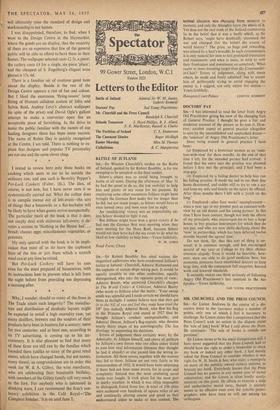SIR,—Sir Robert Boothby has cited various dis- tinguished authorities who
have condemned Jellicoe's tactics at Jutland : Churchill, Admiral Richmond and the captains of certain ships taking part. It would be equally possible to cite other authorities, equally distinguished, who take the opposite point of view : Admiral Bacon, who answered Churchill's charges in 7'he World Crisis—A Criticism; Admiral Beatty (who wrote to Jellicoe after the battle : 'Your sweep south was splendid and I made certain we should have them at daylight. I cannot believe now that they got in to the NE of you and feel they must have tried the SW' [my italics]); Admiral Brock, who flew his flag in the Princess Royal and stated in 1927 that he thought Jellicoe's conduct unimpeachable; and Admiral Dreyer, Jellicoe's flag-captain, who devotes nearly thirty pages of his autobiography The Sea Heritage to supporting his decisions.
Errors of judgement there certainly were; by the Admiralty, by Jellicoe himself, and above all perhaps by Jellicoe's own forces who too often either failed to pass him vital information (because they thought he had it already) or else passed him the wrong in- formation. All these errors, together with the reasons that led to them, Jellicoe set out very fairly in his memorandum of 1932. It would have been surprising if there had not been some errors, for in scope and complexity Jutland was the most confusing naval battle ever fought. It took place for the most part in murky weather, in which it was often impossible to distinguish friend from foe. A total of 250 ships were scattered over hundreds of square miles of sea'. and continually altering course and speed as they endeavoured either to make or lose contact. The tactical situation was changing from moment to moment, and only the Almighty knew the whole of it. Yet does not the real truth of the Judand controversy lie in the belief that it was a battle which, as. Sir Robert says, 'might have drastically shortened the war and changed (for the better) the course of world history'? The prize, so huge ,and rewarding, was missed by a hair's-breadth. In such circumstances it is only natural for men to feel profound frustration and resentment, and what is more, to wish to vent their frustration and resentment on ,somebody. What easier or more tempting target than ,the Commander- in-Chief? Errors of judgement, along with many others, he made and freely admitted; 'but to accuse him of deliberately trying to avoid engaging the enemy is, I suggest, not only unjust but untrue.—
Yours faithfully, .
Hampton Court Palace
• LUDOVIC KENNEDY






























 Previous page
Previous page